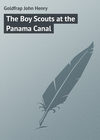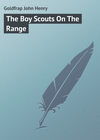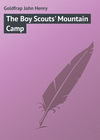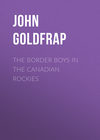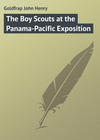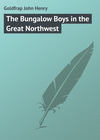Buch lesen: «The Boy Scouts at the Panama Canal», Seite 7
CHAPTER XVII
AT OLD PANAMA
The week following the conversation recorded in the last chapter found the travelers located at the Hotel Grand Central, in Panama City. Colon, although the Americans have done much to clean it up and make it more presentable than in former days, does not hold much of interest. Besides, Mr. Mainwaring’s offices were at Panama, which made his presence there a necessity.
The boys had passed a busy time sight-seeing in the old city. They had climbed the Cathedral towers, gazing out over the glittering bay dotted with small but beautiful islands, where the wealthy Panamans spent the heated months. They had explored nooks and corners and inspected the oldest church on the continent.
On the particular day on which this chapter opens they had planned an expedition to Old Panama city, which lies about five miles from the present town. Mr. Mainwaring was busy, but Fred had obtained leave to accompany the boys, his duties as his father’s secretary not being very onerous. They set out in high spirits along the road leading to the ruins of the golden city sacked by Morgan and his buccaneers.
The drive was made in an aged hack, and hardly had the boys left the outskirts of the town before they were exclaiming over the luxuriant tropical vegetation and the odd sights that met their eyes on every side. Once or twice they crossed small streams, and laughed at the sight of native women pounding clothes on rocks at the water side with big, flat clubs.
“Heaven help the buttons!” cried Merritt. “This must be a paradise for button manufacturers.”
“I guess they don’t bother much with them, at least not the natives that we’ve passed,” chuckled Fred.
“Oh, look at that bunch of bananas!” cried Tubby presently, as they passed by a clump of green banana plants laden with fruit. “Let’s hop out and get some.”
But the fruit was green and uneatable. Bananas, as Tubby did not know, are picked and shipped while green, and grow yellow and ripe on the voyage north in the holds of the fruit steamers, which are kept carefully at a uniform temperature.
“It’s odd that we’ve seen nothing of Jared or his friends,” remarked Rob, as, after the discovery of Tubby’s mistake, they drove on again. “Has your dad notified the police?”
“Yes, indeed,” rejoined Fred Mainwaring, “but nothing has come of it as yet. Of course, a careful lookout is being kept. Say, fellows,” he exclaimed in a cautious tone, “do you know I believe that some plot is on foot to injure the great Gatun Dam and delay the opening of the canal? At least, I’m pretty sure, from things I’ve heard dad say, that such is the case.”
“And you think, or rather he thinks, that Jared is mixed up in it?” asked Tubby breathlessly.
“That’s what. At least he is mixed up in it to this extent, that he is supplying the plotters with plans of the dam and so on in order that they can strike their blow at the weakest part of it.”
“Gee whiz! I’d like to get my hands on that Jared just once,” exclaimed Merritt angrily. “What a skunk he is.”
“It’s a pity we ever let him get away from Hampton,” muttered Merritt. “Of course, we found out that he and the man with him bought tickets for New York, but that was only a blind clew at best.”
“Well, we don’t actually know that he is on the Zone at all,” struck in Rob; “although all the steamship offices were quizzed, we couldn’t find out that anybody answering Jared’s description had taken passage for the Isthmus.”
“So far as that is concerned,” remarked Fred, “dad says that that proves nothing. He might have shipped from San Francisco or New Orleans, or even from some Canadian port for some other destination, and then worked his way up here on a sailing vessel or coasting steamer.”
“And that’s just about what he would have done,” cried Rob. “Both Alverado and Estrada have plenty of sympathizers in Bogota who would help them in any plot against Uncle Sam. But, after all, the whole thing may be a false alarm.”
“You wouldn’t think so if you could have heard what dad said at that meeting of the Canal heads the other day,” rejoined Fred. “Of course I can’t tell you what took place, although I was present in my capacity as secretary; but from what I heard a strict watch is to be kept and the guards doubled.”
“If Estrada and Alverado know the country well, it’s quite likely that they aren’t in the city at all,” struck in Merritt. “The country outside the actual Canal Zone is a trackless jungle. They may be hiding up in there some place.”
“That’s quite likely, too,” rejoined Fred. “I heard dad saying something about that the other day. By the way, we are going to start up the Chagres day after to-morrow; won’t that be bully? That’s my idea of sport, – following up a tropic river looking for a tributary.”
“What’s your dad going to do with the tributary when he finds it?” asked the practical Tubby.
“That hasn’t been settled yet,” was the rejoinder. “Of course, if it proves to be the branch that feeds the Chagres and causes all the trouble in flood time, it will be dammed or something so as to make it harmless.”
“Say, don’t talk so loud,” whispered Rob in a cautious tone, for the boys from their first low tones had gradually drifted into louder talk, “that driver is listening to every word we’re saying.”
“Just like an inquisitive nigger,” growled Fred resentfully.
“He’s not a nigger,” declared Rob; “he looks to me more like a Latin-American of some sort. He may be a fellow countryman of this Estrada. In that case, I hope he didn’t overhear anything.”
“Well, you were talking as loud as any of us,” declared Tubby.
“Yes, that’s so. I kind of wish I hadn’t.”
“Look!” cried Merritt suddenly.
He had good reason to exclaim. Ahead of them, rising majestically above the brilliant-hued tropical greenery, was a vast gray tower, square and massive, and pierced with square windows. At its summit it was overgrown with mosses, lichens and many-hued flowers of gorgeous coloring. But for this, it might have seemed anything but a ruin.
“The ruined tower of the old cathedral church of St. Augustin!” cried Rob.
“And that’s all that remains of the city from which Morgan took so much plunder that it required seventy-five mules and six hundred prisoners to pack it across the Isthmus to Porto Bello,” chimed in Merritt, who, it will be seen from this remark, had been reading up on Panama.
Leaving the rig behind them, the four lads made their way to the foot of the tower. They elected to push their way through a tangle of brush instead of following the regular footpath. As Tubby said, it seemed more like coming to a ruin than by strolling up to it on a beaten track. Their tough khaki uniforms resisted the thorns and brambles valiantly, and they arrived at the foot of the massive old tower out of breath but undamaged, except for sundry scratches on their hands.
They entered the old tower through a tumble-down doorway. The walls, they noticed as they passed through, were three feet or more thick, which perhaps accounted for the sturdy piles standing so long after the rest of the city had vanished. Inside was a crumbled stairway of stone up which the four Scouts were soon scrambling. They clambered to the very top and then Rob and Fred drew from their pockets two pennants. One bore the “totem” of the Eagles; the other was emblazoned with the Patrol emblem of the Black Wolves.
“I thought of this just before we left,” said Rob, as he drew out the Eagle flag; “I guess we’re the first Boy Scouts on the Isthmus and so we’ll be the first to unfurl our totems above old Panama.”
“But how are you going to make the flag fast?” asked Tubby.
“See that prickly branch growing right out from the edge of the tower? I guess I’ll make mine fast to that,” said Rob, “it’ll be as good as a flag pole.”
“Look out you don’t slip,” warned Merritt, as Rob made his way over roughly piled stones that had crumbled from the parapet and gained the edge of the tower. At that point a staff-like thorn bush raised one bare arm aloft. As Rob had said, it did indeed make a regular flag pole.
Balancing himself carefully, the leader of the Eagle Patrol reached out and peered over the edge.
“Wow, fellows, but it looks a long way to the ground!” he exclaimed. “If I ever fell, I’d land with a bump all right.”
Clasping the flag in one hand, he leaned out and laid hold of the upright branch. There was a sudden cracking sound. The horrified Scouts, who were watching Rob, saw him make a desperate grab at the wall to recover himself as the branch snapped.
But Rob’s effort came too late.
“He’s gone!” yelled Tubby, turning as white as a ghost as Rob, without a sound, plunged over the parapet and out of sight.
His chums turned sick and faint. They dared not go to the edge to gaze upon what they knew must lie at the foot of the tower. They simply stood like figures carved out of wood waiting for the sound of Rob’s crashing fall.
CHAPTER XVIII
BETWEEN EARTH AND SKY
But no such sound came. Instead they heard something that brought them instantly to the alert.
“Hey, fellows! Come quick!”
It was Rob’s voice, coming up to them over the edge of that dizzy height.
In three bounds, careless of the consequences of a false step, they were on the parapet of the tower where they had last seen Rob, as he reached out for the treacherous “flag pole.”
“Look, boys! Look! There he is! Hold on, Rob, old fellow. Hold on, for heaven’s sake,” cried Merritt.
Rob, his feet dug into the rough interstices of the old ruinous wall, was clinging to a stoutly rooted bush that had broken his fall and given him one second in which to stay his awful plunge into space. But his position even now was bad enough.
His face was as white as chalk, and the sweat streamed down it in rivers as he gazed up at his comrades above. He was fully thirty feet below them, and they had no rope, no means of saving him from his fearful position! In the very nature of things his muscles, strong as they were, were bound to give out before long. It was not in flesh and blood to endure such a tension long; and then – But they dared not think of that.
It was a moment for quick action and nimble wits. The shrub to which Rob was clinging appeared to be firmly rooted. In fact, it must have been, to have withstood the strain of his crashing fall. Then, too, his toes were driven home into a crack of the wall, relieving to some extent the weight brought to bear on the shrub. But this could not last indefinitely.
Suddenly Merritt noticed something. Just above the place where Rob clung to the wall, a hundred feet above the waving banana fronds, was an opening. As he saw this a sudden idea struck him. He thought he saw a way, a desperate way, it is true, but still a way to rescue Rob from his perilous position.
“How long can you hold on, Rob?” he called down.
“Not much longer I’m afraid,” came back in a voice that could hardly have been recognized as Rob’s, “can’t you get a rope?”
Merritt shook his head. He knew that a search for such an article would take too much precious time.
“No; but you hold on, old chap. Keep up a good heart and we’ll get you out of that, never fear.”
Turning to his companions he hastily explained his plan. An instant later the three Scouts were rushing down the crazy stone staircase headed for the opening above Rob. As soon as they reached it Merritt peered out. Rob was still there, but he looked up appealingly at his chum. Merritt knew what the look meant. Rob couldn’t hold on much longer, but dared not waste breath in speaking.
“Now, then, fellows,” spoke Merritt, turning to his chums, “what we’re going to do is easy enough if you keep cool; but if you get rattled it may fail.”
“We’ll keep cool all right, Merritt,” Fred assured him, though his breath was coming fast.
As for Tubby, his countenance did not betray the flicker of a muscle. Merritt knew he could rely on the fat boy, but of Fred’s more emotional nature he had not been quite so sure.
Suddenly his eye caught sight of something that would make his task easier. In the wall of the opening was a big, rusty iron staple. What its former use had been there was no means of guessing; but Merritt regarded it with delight. It made the daring thing he was about to attempt a little more certain of success.
“Tubby, you just hook your belt through that staple,” he ordered, “and then hang on to Fred’s feet for all you are worth. Fred, you lie down right here, – with your hands just at the edge, – that’s right.”
The boys obeyed Merritt’s orders, but Tubby looked at him with apprehension.
“You’ll never do it,” he quavered.
“Nonsense, of course I will, if you fellows carry out your part. It’s nothing more than wall scaling, only we’re doing it the other way round.”
When all was ready Tubby was lying flat with his belt hooked through the iron staple. He had fast hold of Fred’s ankles, while the latter’s hands came just to the edge of the opening. Merritt was to form the last link in this human chain that was to rescue Rob Blake, if such a thing was possible.
Merritt had already seen that the bush to which Rob clung was not more than four feet below the opening. His daring plan was to lower himself, – with Fred clinging to his ankles, – till he could reach Rob’s hands and help him up to safety.
Without a word Merritt threw himself on his stomach, after taking off his coat and hat, and wriggled to the edge. One look at Rob’s upturned face told him that he had no time to lose. Seconds, yes, fractions of seconds, would count now.
“Catch hold, Fred!”
Fred gripped the daring Scout’s ankles tightly.
“Now hang on like grim death.”
Merritt clenched his teeth and slowly wriggled his way over the edge. Hanging head downward he extended his hands toward the shrub where Rob was clinging.
“Hold on for your lives!” he shouted to those above, and then to Rob: —
“Let go with one hand and grab my right wrist, Rob.”
For an instant Rob hesitated. He dared not let go. But again came Merritt’s voice. This time it was sharp and imperative.
“Let go and grab me!”
Rob’s grip with his left was relaxed and he seized Merritt’s wrist, giving it a jerk that almost pulled his arm out of the socket. For an instant his heart was in his mouth. If the boys above weren’t strong enough to hold them, they would both be dashed downward to the ground that looked so fearfully far below. But both Tubby and Fred were heavy youths, and then, too, the belt that was looped through that accommodating iron staple was an anchor in itself.
There was a slight give and a sag, but the “human chain” held.
“Now the other hand,” ordered Merritt, drawing a breath of relief.
Rob obeyed instantly this time. But he was a fairly heavy youth and it was a good thing that he could take part of the weight off his rescuer’s arms by digging his toes into the cracks of the ruinous tower. Otherwise this story might have had a different ending.
“Now, Rob, use me as a ladder. Don’t look down for heaven’s sake, but reach up and grab my belt. Use the cracks in the wall like the rungs of a ladder and clamber up.”
“Let me rest a minute. I’m winded and dizzy,” breathed Rob, whose nerve was badly shaken.
“Not a minute. Go on now!”
Merritt spoke sharply purposely. Rob rallied and did as he was told. He seized Merritt’s belt as the other boy hung head downward, and, digging his toes into the cracks of the wall, he drew himself up till he could, with his other hand, lay hold of the edge of the opening. After this it was an easy matter, thanks to the ruinous condition of the wall which offered plenty of foothold, to clamber to safety. Reaching it, Rob lay back white and panting.
But in a few seconds he was able to help his chums haul the courageous Merritt out of danger.
It was some time before they felt able to leave the ruined tower, such a bad shaking up had all their nerves received; but at last a move was made. Needless to say, the Scout totems were not flung to the breeze that day.
“I don’t see how we ever did it,” exclaimed Fred, as they reached the ground and Tubby began taking pictures of the tower while the others looked up at the spot where Rob had clung in such dire peril.
“I guess ‘being prepared,’ having good, healthy muscles and all that had a whole heap to do with it,” said Tubby, snapping his shutter; “and now let’s get a move on and get back to dinner, or second breakfast, as they call it here. I don’t know how you fellows feel, but I’m one aching void.”
CHAPTER XIX
THE GATUN DAM
The scene changes to a day when the boys had their first view of the mighty Gatun Dam, a work that, as President Taft said, is “as solid as the everlasting hills.” Picture a vast valley hemmed in by hills heavily timbered with tropical growth. Across the valley floor the current of the muddy Chagres slowly serpentines, with workmen’s huts clustered along its sides, and everywhere preparations being made to hem it in, much as the Liliputians set about harnessing Gulliver, a giant to them.
The floor of the valley, once a trackless jungle and destined within a short time from the moment that the Boy Scouts gazed upon it to become a mighty lake, was crisscrossed in every direction by lines of railroad along which contractors’ engines were puffing and hauling long winding trains of dirt cars. In places, great steam shovels were at work eating out whole hillsides, taking great mouthfuls at a time.
“Like Tubby eating pie,” laughed Merritt, as he watched one of them.
Across the valley floor, the huge dam, a veritable mountain of concrete, was rising. Busy human ants swarmed everywhere and, at the spot on which the boys stood, with Mr. Mainwaring and some assistant engineers to explain things, hundreds of black workmen were working like beavers on the summit of the great wall. Where they stood the wonderful dam was 100 feet wide, just one-fourth the length of the steamer on which they had come to the Isthmus.
At the base of the dam the width of the gigantic structure is 1,900 feet, and its massive foundations go down into the earth for many feet more.
“Just think,” exclaimed Rob, aglow with the wonder of it all, “before long all this valley floor will be a huge inland sea across which vessels can push their way from Pedro Miguel to Gatun.”
The roar of an excavating machine drowned his comrades’ replies, but their looks showed how deeply they were impressed.
“It makes you feel like a – a fly speck,” exclaimed Tubby, when the uproar ceased for an instant.
Up along a line of rails glided a movable steam shovel. On a side track a busy little locomotive had already bunted a train of flat cars. There was a loud clatter of chains; two white spouts of steam leaped high above the shelter which protected the steam shovel’s engineer from the burning sun. Down swung the huge steel dipper. Almost like a hungry human being, rather like some famished giant, it swung its iron-toothed jaws apart and bit deep into a bank which had to be moved. In an instant its mouth was closed again and the receptacle was full of rough, broken material. Big rocks were among the earth, but that made no difference to this devouring leviathan.
“Hi!” shouted a big shining negro man on the flat car.
The big steam shovel gave a sharp scream of warning, the steam spurted forth again from the vent pipes and up swung the load. The long arm slowly reached out above the flat car. A mighty scampering of the negro loaders followed.
“Hi!” came the cry of the boss negro again.
The bottom of the dipper opened. There was a roar of falling rock and earth and a flat car was filled. Then the process was repeated till the hillock that was to be removed melted away like a plate of ice cream before a healthy boy.
Thus, amid shouting, seeming confusion, the clanging and crash of metal, the scream of steam whistles, shouted orders and the noise of steam and the fog of smoke, the work went on, – the mighty job that Uncle Sam, contractor, is putting through for the benefit of the civilized world.
Mr. Mainwaring told the boys that there is keen rivalry among the steam-shovel men. Prizes are given every month for the record amount of dirt that flies. Each shovel is pushed to the limit of its capacity. In an eight-hour day one of the steam shovels excavated and loaded on flat cars 3,500 cubic yards. This means about 160 carloads for the day, or a carload every three minutes.
The boys noticed, too, that the negroes, Italians and Spaniards toiled away at their tasks without appearing to take much interest in their work beyond keeping just hard enough at it to avoid getting into trouble. But on the faces of the “gold-men,” as the engineers and American officials are termed, was the stern determination of men animated by a great purpose. Off duty, the gold-men, so called because they are paid in American gold and not in Panama coinage, are a joking, jolly lot of men, who like to play tennis and baseball, and indulge in all sorts of sports. But on duty, clad in khaki and gaiters, with great sun helmets to keep off the baleful rays of the tropical sun, they are like changed men.
The expression the boys noticed on their faces as they hurried about with blue prints or levels and theodolites was set and stern. They seemed to be, in a way, instruments of a great destiny. Each bore himself as if he knew that the work in hand required the best that was in him.
“It seems to me,” said Mr. Mainwaring, “that these great steam shovels and their crews, the activity and all the purposeful bustle and hustle down here, represent more fully than anything that I have ever seen the determined, fearless American spirit that has overridden what appeared to be impossibilities, and is carrying the Canal through to a triumphant completion. It’s a great thing for a boy to be able to say that he has seen such a work, and it will be a still greater thing if he takes to heart the lessons to be learned here on every hand.”
Here he looked at Tubby who, not paying any attention to this “preachifying,” as he mentally termed it, was drinking the milk out of a cocoanut. The fat boy had become very fond of the cocoanut, which can be bought on the Isthmus for little or nothing. He had slung several around his waist and at intervals, amidst the dust and turmoil of the work on the great dam, he refreshed himself by a copious draught of their cool contents.
At the boys’ feet, as they stood on the lofty concrete battlement, lay the cut for the Gatun locks, which will raise and lower vessels eighty-five feet. There are no such locks anywhere in the world. While the boys watched, a steady stream of concrete was being poured into giant moulds for the locks, and rows of arc-light poles, like gaunt trees, showed that under the glare of electric lights the work was pushed forward even at night. Not a minute of time was wasted all through that vast system. They soon had become aware of that.
While the boys stood there an erect, military-looking man came up to Mr. Mainwaring, who greeted him with every appearance of respect. The newcomer was tall, bore an air of authority, and was dressed in a white military uniform.
“Colonel,” the boys heard Mr. Mainwaring say, after a few minutes’ grave conversation, “I wish to introduce to you my son Fred and his three chums, – all, as you see, Boy Scouts.”
Tubby hastened to chuck his empty cocoanut shell off the top of the dam as he saw that a social ceremony was going forward. The shell lit on a negro’s skull far below and bounded off with a loud crack.
“Mah goodness, dem musquitoes is wusser dan ebber to-day,” the negro remarked to the man shoveling at his side, which would have made Tubby laugh if he had heard it.
After a few kind words to the chums, the military-looking man passed on, stopping every now and then to examine the work with every appearance of minutest care.
“Wonder what kind of a boss he is?” remarked Tubby nonchalantly after he had passed on. “Steam shovel boss, concrete boss, dynamite boss, engineering boss or surveying boss, – there are other kinds but I forget ’em.”
“Why, you chump,” roared Fred, “don’t you know who that was?”
“I didn’t catch his name,” rejoined Tubby.
“Well, that wasn’t anybody more important than Lieut. – Col. George W. Goethals, chairman of the Isthmian Canal Commission, and known as the ‘man who dug the ditch.’”
“Oh-h-h-h-h-h!” mumbled Tubby, a great light breaking upon him, “I guess I’ll take another cocoanut on that.”
And the fat boy selected a fine specimen from the several that adorned his belt like scalps hanging round an Indian warrior.
